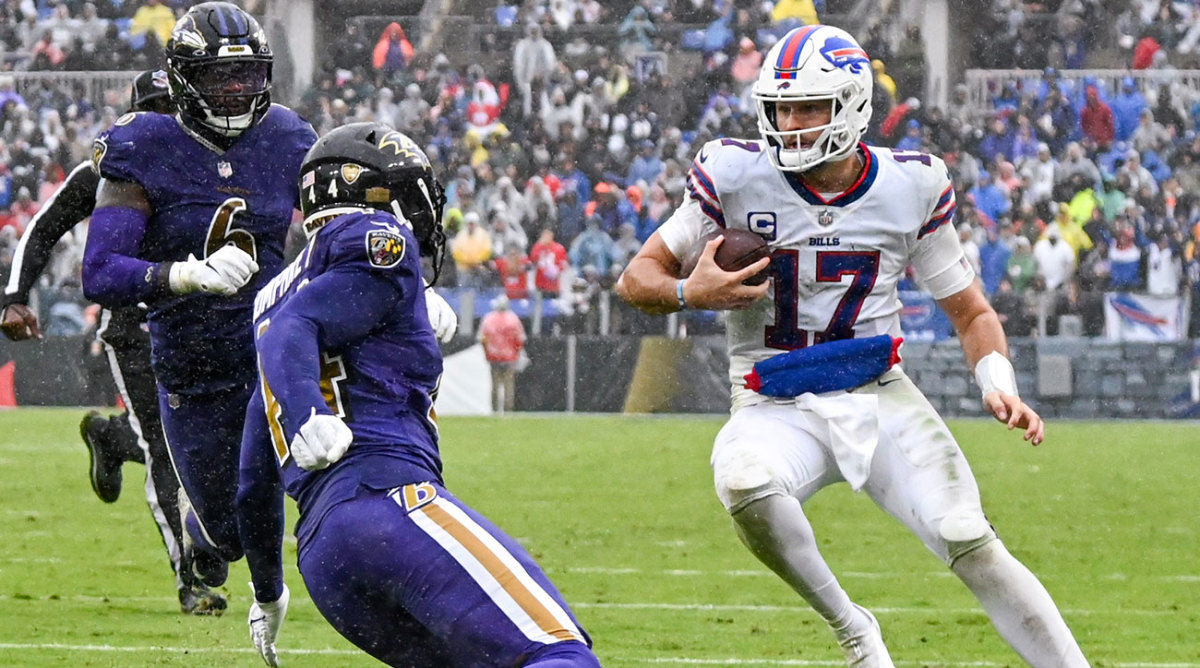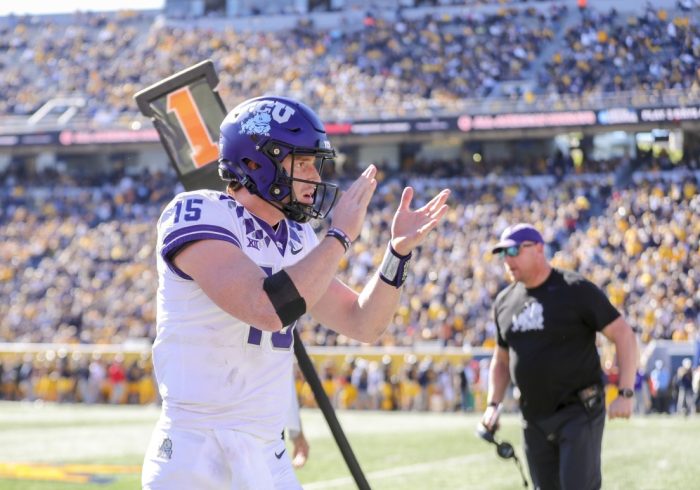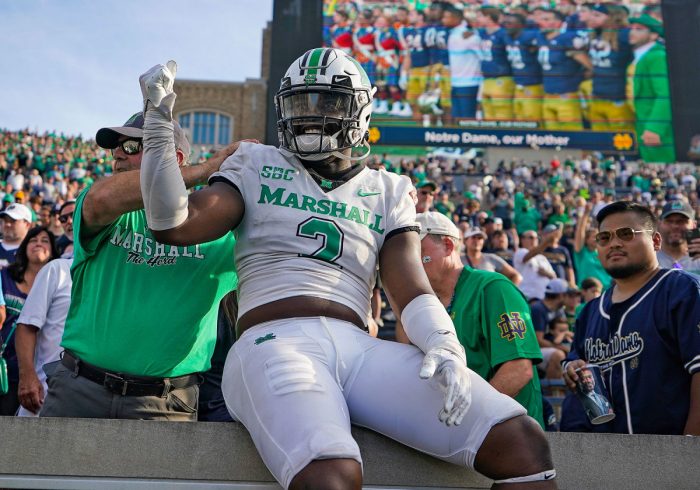The job was almost done.
The Bills had weathered a keyed-up M&T Bank Stadium crowd, another virtuoso effort from Lamar Jackson, a Ravens defense that showed signs of coming alive and monsoon conditions. The ball sat on the Baltimore 11, with John Harbaugh having burned his second timeout, first-and-10 coming and Josh Allen convening with Sean McDermott.
In the past, Allen might’ve ridden all that emotion right over to his coach. But not now, not with Buffalo on the precipice of doing what millions spent the week saying it couldn’t.
“They only have one timeout left,” the quarterback said to his coach. “If we get the first down, it’s over.”
“He knew right away,” McDermott recalled.
And when Allen said that, McDermott knew the game was, definitively, over, because the quarterback took that back to the huddle, and the Bills managed the final 1:50 of a 60-minute fight with a very game Ravens group accordingly.
Allen looks for a place to run, through the raindrops and around the Ravens.
Tommy Gilligan/USA TODAY Sports
We’ll get to the details on how Buffalo did it, but the important thing, the thing that struck those on the Bills’ sideline, was Allen’s demeanor in the moment—and that he did it after making the sort of breakneck plays that have become his trademark to get Buffalo down the field. There was a downfield touch throw to Dawson Knox for 20 yards on a third-and-2 that sparked the march. There was a Houdini escape on a scramble play, followed by an against-his-body bullet to Khalil Shakir two plays later, to put the Bills in field goal range.
Yet, through the whole thing, Allen kept his head about him, so much so that he was taking the lead on clock management at the wire. And McDermott was happy to cede it to him.
“He’s such a competitor to get us even into that situation to begin with,” McDermott said, leaving the stadium an hour or so later. “He loves to compete. And then what I saw today, in particular, Albert, was just he was so calm. He knew exactly what he wanted to do with the ball, and then he knew exactly what the situation was as we got closer to the goal line.”
So in the huddle, he reminded Devin Singletary to hit the deck near the goal line if he sensed Baltimore was letting him score (which Singletary did). Then, on second-and-2 from the 3, he took the keeper off left guard and effectively hit the deck at the 1 to move the chains. And all that left was two kneel-downs and a chip shot to give the Bills a 23–20 win.
This was a big one for the Bills, and for Allen. They answered the bell, and in a way that doesn’t just silence their few remaining doubters. It also happened—through Allen’s calm—in a way that should serve them well three and four months from now.
We’ve got four weeks under our belts (can’t call it the quarter pole anymore, since the season’s 18 weeks with 17 games for every team), and a lot to chew on after a fourth straight Sunday of wildly entertaining football. Inside the MMQB column, you’ll find …
• A look at the Vikings, Chargers and, yes, the high-scoring Seahawks in Three Deep.
• More news on the Tua Tagovailoa/concussion front to top the Ten Takeaways.
• How the NFL sees Bryce Young in Six from Saturday.
But we’re starting with the Bills, who looked like world beaters through two weeks, then had six (or so) quarters of uneven football to fight past Sunday.
Narratives can be finicky during the NFL season, and the way the last two weeks went for the Bills is a pretty good indicator of that.
One week, the Buffalo roster was an unstoppable machine, worthy of 17–0 and even 20–0 speculation and projection. Quite literally the next, the same Bills were cast as a group that really didn’t know how to win when it mattered most—evidenced by the team’s 0–7 mark in one-score games in 2021 and ’22.
The truth? Well, the nuance in the above facts, and they are facts, is that a lot of the same guys who’ve populated the Bills’ roster the last year-plus were also on a 2020 team that went 5–1 in such contests and played in the AFC championship game. Also, the fact that the Bills blew so many teams out (hence the lack of one-score wins) probably shouldn’t be used against them, and it’s not like all the one-score losses (see: Kansas City) were systemic failures.
And all that’s probably why Allen was unshaken under some challenging psychological circumstances that faced the Bills on Sunday afternoon in soggy Baltimore.
After opening the season with blowouts of the Rams (31–10) and Titans (41–7), the Bills stumbled down the stretch in a wholly inefficient performance in Miami—somehow falling 21–19, despite running 90 plays to the Dolphins’ 39, outgaining the hosts 497–212 and posting 31 first downs to Miami’s 15—then fell behind 20–3 in Baltimore.
The bad start in Baltimore, like the uneven game in Miami, was largely a function of letting a lot of little things slide and add up. Allen let a wet ball slip and missed Dawson Knox a little wide, Knox didn’t get to it, and Marlon Humphrey picked it off on the third play from scrimmage, running it back to the Buffalo 4. A fumble followed that two possessions later. There were bad drops in the rain. There were missed tackles on Jackson.
It was a mess, and were it not for an offensive pass interference call and a timely sack that forced field goals, the deficit might’ve been larger than 20–3.
“If I knew the exact reason [for it], I’d be paid a lot more money to coach,” McDermott said with a laugh. “If I knew it’d happen, I would’ve addressed it ahead of time. I thought we were ready, that we had gotten back. I just think Baltimore’s a good football team. They were being aggressive, and we weren’t executing. We weren’t playing our style of football. We probably just needed to settle down more than anything.”
They would, after Justin Tucker’s 51-yarder was knocked home for the Ravens’ 18th, 19th, 20th and final points of the afternoon, with 3:44 left in the first half. After the teams then traded three-and-outs, Allen led the Bills on an 11-play, 76-yard drive, with the Bills getting to the end zone needing to convert only one third down—and it was a third-and-1—to head into the locker down just 20–10.
“That was good,” McDermott continued. “It was a confidence builder, a momentum builder. Obviously, it just got us offensively into a rhythm a little bit more than we were prior to that.”
And set the stage for a tough, physical second half that played out like a prize fight.
McDermott loved what he saw from his quarterback during the big moments Sunday.
Tommy Gilligan/USA TODAY Sports
The Bills scored on their first two possessions of the second half—scoring a touchdown and a field goal on drives covering 131 yards, to tie it at 20—and looked ready to take over after their next one was set up at midfield, after veteran safety Jordan Poyer plucked a ball Prince Emili had tipped at the line out of the air for his first pick of the day.
But Buffalo went three-and-out, and the Ravens, and Jackson in particular, responded in a very big way—driving 93 yards in 13 plays, to move the ball from their own 5 all the way to the Bills’ 2, for fourth-and-goal. Baltimore’s long, grinding drive stalled in the red zone (Matt Milano dropping J.K. Dobbins for a three-yard loss on second-and-goal from the 1 was huge) leaving Harbaugh with a decision to make.
A field goal would have given his team the lead. But a field goal, he figured, might not be good enough with Allen on the other side. “I felt like [going for it] gave us the best chance to win the game,” Harbaugh told reporters afterward. And that Harbaugh thought that, of course, didn’t surprise McDermott much, with the two having spent nine years together as assistants in Philadelphia. “John’s an aggressive head coach, and he has a lot of confidence in his players,” McDermott said. “Lamar is dangerous in those situations, too. So I wasn’t surprised.”
The Ravens’ coach also raised another point—“The other thing, you think they’re gonna get the ball at the 2-yard line [if you don’t convert].”
Thanks to Poyer, things didn’t work out that way. On fourth-and-2, coverage allowed for Greg Rousseau and Shaq Lawson to chase Jackson off his spot, and forced Jackson to launch the ball off-balance into the back corner of the end zone, putting just enough air under it for Poyer to undercut Devin Duvernay and give the Bills possession at the 20.
“That was a big play,” McDermott said. “I thought our rush did a good job of staying after Lamar. He’s so elusive, especially in those situations—those red zone and short-yardage situations overall. Jordan was in great position. The rush complemented the coverage; coverage complemented the rush and we got one there. Great play by Jordan.”
And a meaningful one, too, in that it came from Micah Hyde’s running mate at safety, in Poyer’s first game since Hyde was lost for the year—the two were signed together in McDermott’s first offseason in Buffalo, and McDermott actually spoke with Hyde right after the game Sunday (“It was good to see him in good spirits)—and, of course, it set Allen up to go do what Allen’s done so often for the Bills.
From there, there was the calculated third-down, downfield gamble to Knox, and the great escape and fastball down the sideline to Shakir and, finally, just as important, this more mature version of Allen’s game-managing the Bills to a win as the clock ticked down.
Which all started right after Allen visited with McDermott on the sideline, as Singletary sensed the defense had opened a little too aggressively for him on that first-and-10 from the 11, and knew well enough to dial back his fight, even understanding, in that spot, that getting the first down could be a problem.
“Devin was on top of it,” McDermott said. “Really, hopefully, everyone was. But Josh was as well, in terms of not scoring. We knew where they could be with Devin getting that first down on that play. I think we thought there would be 15, or roughly 15, seconds left, something like that. So we were on top of it, and our guys in the press box did a great job of laying that one out, and the players executing did a great job there as well.”
And then, as the math had it, Allen could pick up the first down on the next play but wanted to avoid the end zone, and keep it on the left hash where kicker Tyler Bass liked it.
A 21-yard chip shot later, and another narrative was dead. At least for a week.
McDermott understands, better than any of us, that these story lines are fleeting. The Bills’ place as a burgeoning juggernaut was attained after a playoff loss, and a year in which Buffalo bowed out a round earlier than the season before. Conversely, the loss to Miami was a game the Bills largely controlled, and one played in pretty adverse conditions.
That said, from the start, McDermott sensed a playoff-level intensity to this one. Maybe it was the opponent. Maybe it was Lamar. Maybe it was how last week went. Whatever the reason, it felt bigger than Week 4.
“Yeah, I mean, it really did,” he said. “Even coming out of the locker room at the beginning of the game, you could just feel it, maybe because of the weather, the field, the cloudiness, the grayness of the day. Yeah, so it was just, again, two really good football teams. They’re really well coached. A lot of respect for Harbs. He had them prepared. They had a great plan. And I thought our guys did a great job adjusting and executing when we needed to.”
And yes, it does answer the question of the week, on whether his team can win close games. But more than that, as McDermott sees it, it should prepare the Bills for what’s coming more so than the blowouts of the Rams or Titans ever could.
Bottom line, from here on out, Buffalo’s getting everyone’s best shot, and while that’ll make the season a grind, seeing it for what it is now should help.
“I think any time you can go through that early in the season, you don’t want it to come up, but naturally these games are pretty close, and having that, to be able to win like that, I think is really good for the grit of the team moving forward,” he said. “I just think that that’s important, to be able to win that way, especially early in the season.”
Truth is, deep down, McDermott already knew the Bills could.
Now everyone else does, too.
More NFL coverage:
• Kenny Pickett in Good Hands With Mike Tomlin
• Next Man Up: Top Coaching Candidates for 2023
• We Need Answers About Tua Tagovailoa’s Injuries
• Ryan Griffin’s Long Life As Tom Brady’s Backups’ Backup



